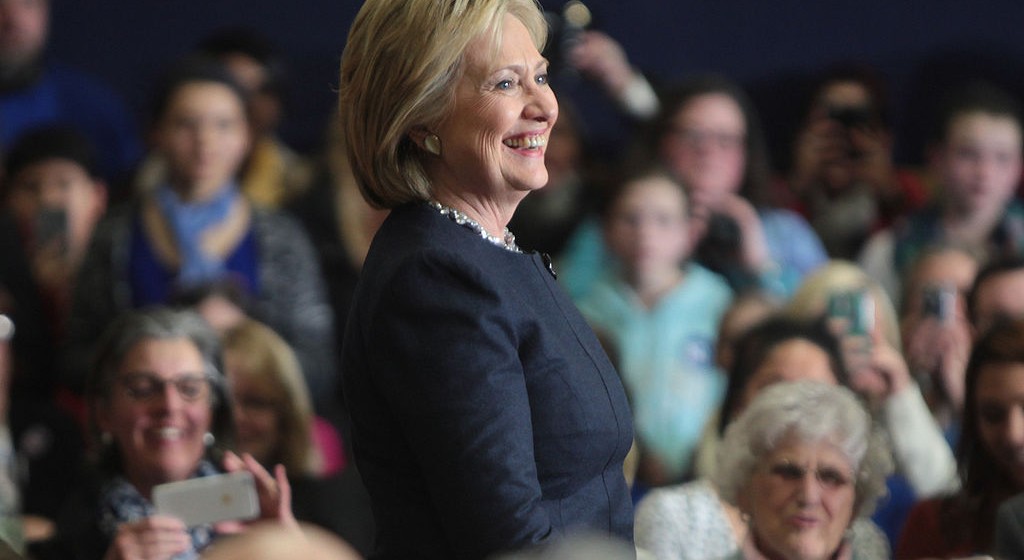In the likely event that Hillary Clinton secures the Democratic nomination by the end of May or early June, the task of uniting the party behind her will be much less onerous than that of whoever emerges from the GOP field. For Republicans, a ‘brokered’ convention looms on the horizon. And, given the severely fractured status of the conservative movement in America, it will be hard for any candidate—Trump or otherwise—to appeal to a national constituency that seems to lack any consensus on what it means to even be “conservative.” Secretary Clinton, on the other hand, would have the time and resources to bring unity to her platform and to her party following what has been an impressive challenge by Vermont Senator Bernie Sanders.
It would be a mistake to disregard Senator Sanders’ bold challenge for the nomination as a mere episode of fascination exercised by liberal-minded millennials and “green” activists. Senator Sander’s campaign has exposed Mrs. Clinton as a candidate with a “credibility problem,” who is often perceived as representing ‘the powers’ behind government (lobbied interests) rather than ‘the people’ by whom that government is made. The stakes will be too high in November for her to come back to the American people with the same story. She needs to adjust, nay, pivot the center of her political narrative.
Any calculation over what narrative the Clinton campaign should employ requires at least an estimation of who she might be up against this fall. However unsettling a Donald Trump-led GOP ticket sounds, at this stage it is the likeliest scenario. In the event that it stays this way, what should a Clinton narrative look like? I would argue that if Mr. Trump were nominated, it would provide Mrs. Clinton with the best possible opportunity to establish a credible and provocative political contrast between herself and the alternative. Allow me to illustrate.
The Trump political narrative centers on a very simple idea: America is losing (on all fronts). “This county is in big trouble,” declared Trump at the first GOP debate in August 2015, “we don’t win anymore. We lose to China; we lose to Mexico—both on trade and at the border. We lose to everybody. And frankly what I say…is what I say.”
Governed by an acutely ‘zero-sum’ logic of world affairs, the premise of Mr. Trump’s argument is this rather fanciful portrayal of America’s quiet past, when it was supposedly a nation that was decisive and powerful—a nation that once won great victories, amassed great wealth, and was unapologetic about its doings. This openly nationalist, chest-beating tone is compounded in credibility by Mr. Trump’s own character—that of the successful, “self-made,” all-American billionaire, who says and does what he pleases. He represents for many the antithesis of the Washington, D.C. breed of politically correct bureaucrats and stale, establishment politicians.
This, of course, is all fiction. Mr. Trump, by his own admission, inherited much of his wealth. His enterprising ventures have failed about as much, if not more, than they have succeeded. And, make no mistake. He is as much a politician as any senator, only with a much bigger wallet. Yet, it’s not who Mr. Trump actually is that interests the electorate; it is what he represents—the anti-political animal. It is this narrative that informs and molds Trump’s perception in the eyes of his supporters.
What does Trump offer for a political narrative? In four words: “make America great again.” He claims he would return the country to its ‘former’ glory, and do so not with humility and circumspection, but with bluster and demagoguery. He does away with the contriving language of political correctness (particularly in regards to Muslims, Mexicans, immigrants, etc.) in an attempt to convince the electorate that he, in fact, ‘speaks true;’ he engages in rhetoric that is, according to Senator Marco Rubio, “language that is deliberately offensive in order to drive media narrative.” He is tapping into the anger and frustration of many Americans whose economic prospects have been stifled by structural unemployment, and he is using this strategy to legitimize and sanction the unfiltered expression of human emotion and fear—this includes physical violence against protesters at his rallies. And it’s working, so far.
What kind of a narrative could Mrs. Clinton and the Democratic Party thus employ to halt the ‘beast of Bethlehem’ in its tracks? The answer is surprisingly simple, but powerful (if credibly communicated): love.
First and foremost, Clinton’s ‘war room’ should begin scrapping the headline of the current campaign narrative, which focuses almost exclusively on her experience and political centrism. It would be a mistake to continue with such a strategy considering the anti-establishment fervor we are witnessing within both the conservative and progressive voter bases. Communicating policies and campaign promises should be secondary to the rhetoric of contrast with the opposition. This is precisely what the Obama campaign did in 2012 against Mitt Romney. They spent the first three months of the head-to-head campaign framing Mr. Romney as a cold-hearted businessman out of touch with the American people. And by the time Romney slipped with his infamous “47 percent” comments, it only reinforced what the Obama campaign had previously said about him. Trump has already made all the rhetorical gaffes needed for framing such an argument. Clinton must now use them.
The second step for Mrs. Clinton would be pivoting her rhetorical focus leading up to, during, and following the Democratic National Convention. Each of these three narrative divergences would provide a salient contrast to Mr. Trump’s campaign. Be on the look for her employment of these (in speeches, debates, and ads) as we inch towards November:
- Unity v. Division
- Whereas Trump promotes a worldview of “us v. them,” further estranging Americans from each other, Mrs. Clinton can situate the electorate in the historical moment by reminding her audience(s) of America’s long struggle with racism, xenophobia, and bigotry; she must make a clarion call to millennials (who largely have a more liberal view of social issues than their parents or grandparents) to join in her effort to stop the ‘dogmas of the quiet past’ from taking control yet again;
- Love v. Hate
- Whereas Trump promotes (physical) violence against those who disagree with his point of view, carries on about building a wall between Mexico and the U.S., amid other instances of bluster, Mrs. Clinton should invoke a language of peace, rather than chaos—championing tolerance towards others, not bigotry. She should challenge the American people to have courage in the face of terror, and extrapolate on how her faith informs her conviction that Mr. Trump’s rhetoric is more than just inflammatory, but morally wrong;
- Humility v. Showmanship
- Finally, whereas Mr. Trump will take the GOP stage and likely use it to glorify his wealth and his success in vanquishing his political rivals, Mrs. Clinton should assume a more humble tone; she should speak to those who doubt her ability to lead, and perhaps most importantly, in her ability to represent ‘the people’s’ interests. She should make a distinction between a good ‘salesman’ and being a steadfast leader. And this means acknowledging the imperfection of her record, instead of running from it. She does not need to dwell on her mistakes, but she should make clear how she has learned from them. If she is able to do these things successfully, Mrs. Clinton may yet be able to pivot people’s perception of her character and her candidacy.
The final, and perhaps most important, step for Mrs. Clinton to make is the injection of urgency into her message. We have seen time and again in American politics that the electorate is far less persuaded by what candidates say than by why they are saying it. Mrs. Clinton must take this opportunity to elevate the stakes of this election in the eyes of voters, and to employ a narrative that allows her candidacy to rise above the vitriolic rhetorical tendencies of her likely opponent.
And so I say to Mrs. Clinton: “once more, with feeling Madame Secretary.” Take note of the ‘audacity of hope’ from candidate Obama in 2008, as well as from Senator Sanders. Bring renewed urgency and energy to your words and your stories. Speak truth to power, even at the risk of your own political flank (like Senator Obama in his speech on “A More Perfect Union”). Don’t give us bland plans and policies. Give us a dream, Mrs. Clinton. Give us a dream.





